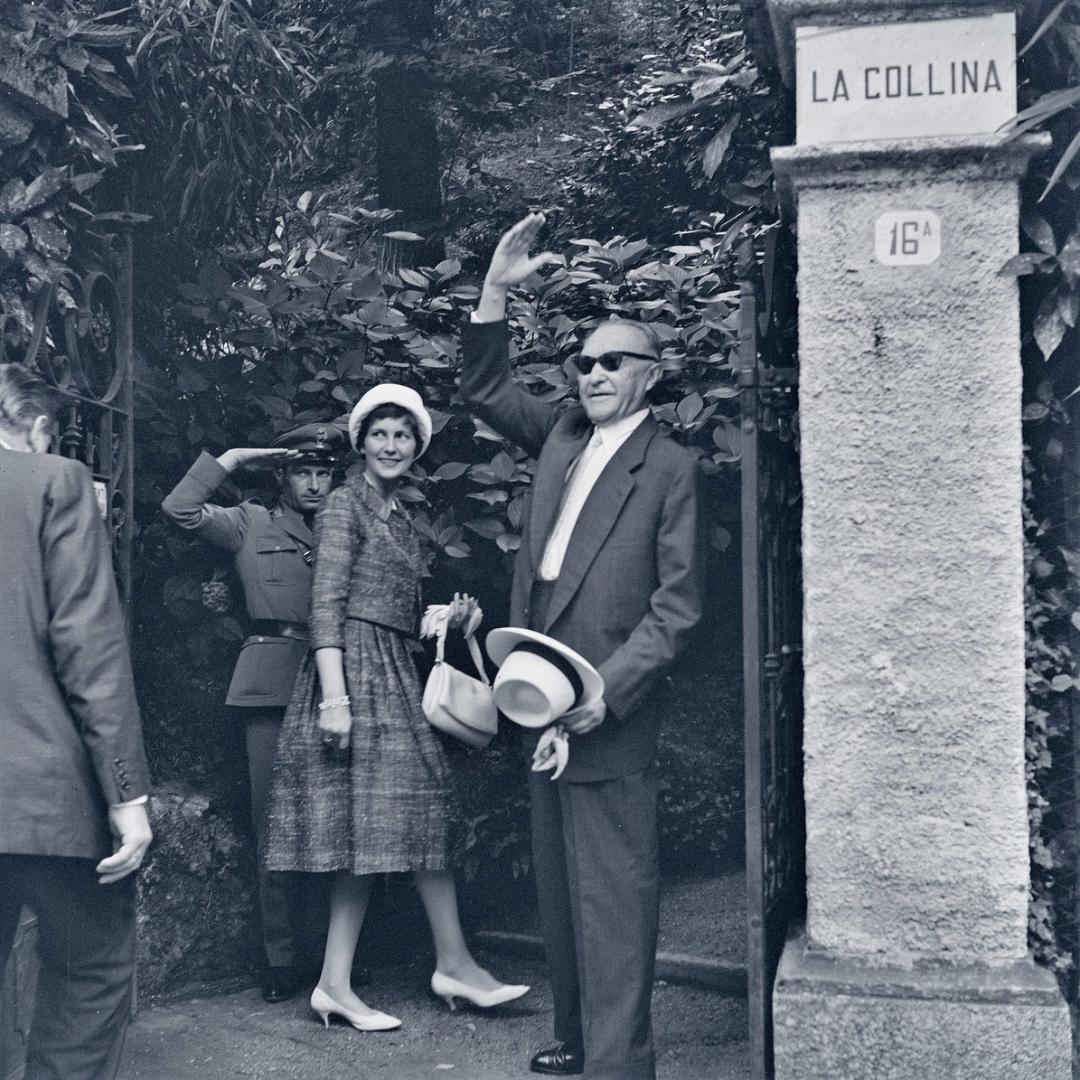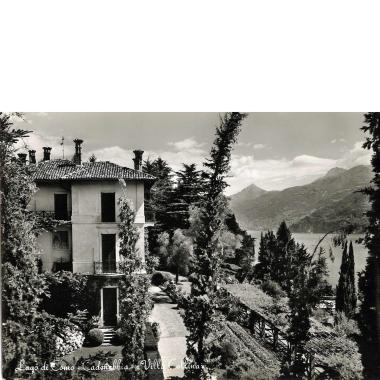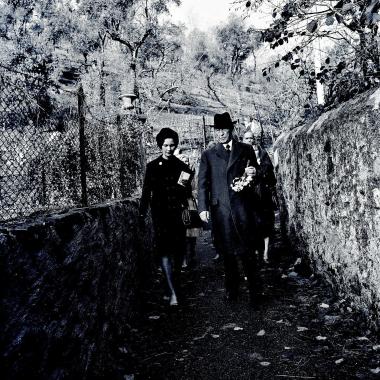History of the Villa
The historic Villa La Collina was built in 1899 by the Milanese hotelier Suardi and was used as a private summer residence until the 1930s.
After the property came into the possession of the French aristocratic Gallifet family, the villa was also used by them as a private summer holiday residence until the early 1950s.
When Konrad Adenauer came to the small, dreamy village of Cadenabbia on the recommendation of his foreign minister Heinrich von Brentano, he initially lived in two other villas near Villa La Collina in 1957 and 1958. Despite being 81 years old, Adenauer was in excellent health and, after being shown how to play boccia by a carabinieri on one of his first visits to Italy, he was an enthusiastic and very ambitious player. Adenauer always enjoyed walking with his secretaries and daughters from his summer residence through the town to the local boccia court directly behind Villa La Collina. One of the players - the then mayor Roda - knew the owner of the villa, and thanks to his mediation, the Chancellery was able to rent the property for Adenauer and his entourage fifteen times in a row from 1959 onwards.
However, the villa had not been used by the Gallifet family for many years and was in a rather sad state a few weeks before the famous new guest's first visit. There was no ‘residence’ to speak of, and the charm of the landscape and the 27,000 square metre park was far greater than that of the villa at the time. As it was also more or less unfurnished, some furniture was collected from the neighbouring hotels.
In addition, the house was equipped with the means of communication of the time, and Adenauer brought along a large staff as well as a safe with secret documents, table linen, cutlery and many other everyday items from Germany. The logistical effort involved in his visits was considerable. When Adenauer returned to Rhöndorf after eight weeks at the latest, all the furniture was taken back to the hotels. When he returned to Cadenabbia six months later, the furniture from the unoccupied rooms in the hotels had been brought back to Villa La Collina.
Although the Federal Chancellor was officially on holiday at Villa La Collina, official business continued as usual. In some years, high-ranking visitors from the worlds of politics and business came and went, telephoning and corresponding. The ‘substitute chancellor's office’ on Lake Como functioned smoothly even almost eight hundred kilometres away from Bonn.
The villa was always a very special retreat for Adenauer, where he took many topics with him to discuss them again with various experts in the tranquillity of Cadenabbia before announcing his decision. The idyllic setting and spirit of Cadenabbia still offer a special atmosphere of both creativity and leisure today.
After Konrad Adenauer's death in 1967, a German road construction entrepreneur and Adenauer fan bought Villa La Collina and used the property exclusively for private purposes before putting it up for sale again ten years later.
The Konrad Adenauer Foundation as owner of Villa La Collina
It was only natural that the Konrad Adenauer Foundation acquired the holiday home of its namesake, including the 2.7-hectare park, in 1977. This was not only a way of preserving a historical monument, but also an opportunity to continue working in the spirit of Konrad Adenauer in a place that, more than almost any other, allows for inner contemplation and intensive dialogue.
From then on, the spacious property was to be used primarily for the Foundation's political education work. However, it became apparent that the villa was too small for larger events. At the beginning of the 1990s, a second building was therefore constructed below the villa: the ‘Accademia Konrad Adenauer’, which blends in carefully with the entire complex. This extension can now accommodate up to 61 guests.
In the course of this spatial expansion, the utilisation concept was also extended. While the German-Italian perspective had previously been the main focus, this framework has now been extended to the whole of Europe and beyond. And while Villa La Collina was initially a place for meetings of political celebrities, which could only be visited at the invitation of the Konrad Adenauer Foundation, it now opened up to seminars for executives, congresses and conferences, as well as holidaymakers and day visitors who wanted to get to know the estate and the villa as a substitute chancellery.
The combination of increased space and conceptual expansion made it possible to operate the facility more economically. Villa La Collina is now recognised by the Federal Republic of Germany as a ‘memorial site of national importance’. The Konrad Adenauer Foundation is the owner, while a separate operating company is responsible for day-to-day operations.
Politics, art and more
The villa is still a place of seclusion and work today, just as it was in Adenauer's day. The foundation maintains this heritage and keeps the spirit of those years alive. Every year, around 2,000 guests come to take part in Konrad Adenauer Foundation events in this special atmosphere, where analyses and recommendations on important political issues are developed.
Every year, the Konrad Adenauer Foundation organises around 70 to 80 conferences and educational events in Cadenabbia. Here are just a few examples of the events organised:
Since the 1980s, the Villa La Collina has regularly hosted German-British parliamentary meetings with British Conservatives and German CDU politicians. The meetings are not about academic disputes, but about the day-to-day practice of politics. The CDU, which had only recently been in government under Helmut Kohl, was able to benefit from the British Tories' longer experience in government.
Since the mid-1990s, German officials in international organisations, as well as important representatives from business and politics, have met once a year in an informal atmosphere to exchange experiences and make contacts. Current problems are discussed and insights into the respective other area are provided.
Together with the think tank ‘European Ideas Network’ (EIN), work is being done in Cadenabbia on joint strategies for all European parties from the Christian Democracy environment. Guidelines are developed for topics such as demographic change, security and the external borders of the European Union, which serve as an aid to the parties for their own policies.
Small and large international conferences are also regularly organised at Villa La Collina. In recent years, the focus has been on the Baltic states, the European Union, the Balkans and Africa. In addition, the programme covers such diverse topics as development policy, good governance and state reforms.
Since 1995, Cadenabbia has been the venue for the Konrad Adenauer Foundation's writers' workshop. Every year, in autumn, twelve to 15 writers come together at Villa La Collina to read from previously unpublished texts and discuss these works with critics, Germanists and politicians. Almost 100 authors have taken part in the twelve workshop rounds. Inspired by the picturesque ambience of Lake Como, a series of poems, prose pieces and diary entries were written and published in the anthology ‘Cadenabbia als literarischer Ort. Schriftsteller am Comer See’ (Münster: LIT Verlag, 2006, 185 p., 30 ill., hardback, 19.90 euros). The authors include Elisabeth Borchers, Ulrike Draesner, Elke Erb, Thomas Hürlimann, Daniel Kehlmann, Hartmut Lange, Patrick Roth, Burkhard Spinnen, Arnold Stadler and many others.
In the meantime, Cadenabbia has also become a meeting place for visual artists supported by the Else Heiliger Fund (EHF) of the Konrad Adenauer Foundation. Together with authors, composers, gallery owners, museum directors, journalists and festival organisers, they discuss socio-politically relevant issues that transcend the boundaries of cultural disciplines - be it the question of taboos in art and literature or the relationship between art and power. Whether authors' workshop or EHF workshop: Cadenabbia stands for the concept of dialogue culture in a diverse and convincing way.
In addition, the foundation in Cadenabbia also offers civic seminars on political education. They deal with post-war politics in Germany and Europe and pay particular attention to the work of Konrad Adenauer.
As a European meeting place, a creative workshop for writers and artists and not least as a conference centre, Villa La Collina has long been an indispensable part of the Konrad Adenauer Foundation.
Contrary to what one might expect, we will never turn the villa into a classic luxury hotel in terms of room furnishings, as it was very modestly furnished in accordance with Konrad Adenauer's ideas, even in his day. In contrast to the classic hotel business, today at Villa La Collina we try to combine the extraordinary history and the spacious nature of the property with the ambience of a private guest house and to merge the Italian dolce vita with German organisation and reliability to create a special overall experience.
Villa La Collina is open to guests from March to November each year.

































